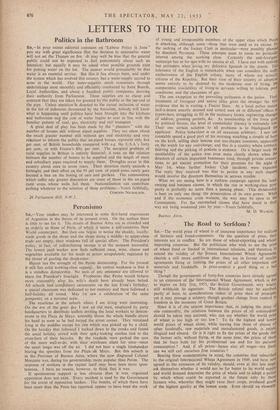LETTERS TO THE EDITOR
Politics in the Bathroom
your recent editorial comment on "Labour Policy in June " you say with great significance that the decision to nationalise water will not set the Thames on fire. .It may well be true that the general public could not be expected to feel passionately about such an intention; but equally it may be asked what possible grounds exist for putting water on the list. The answer would presumably be that water is an essential service, But this it has always been, and under the system which has evolved this country has a water-supply second to none in the world. Our water-supplies reach consumers through undertakings most smoothly and efficiently conducted by Joint Boards, Local Authorities, and about a hundred public companies deriving their authority from Parliament. These supplies are so cheap and constant that they are taken for granted by the public at the tap-end of the pipe. Unless attention Is directed to the casual inclusion of water in the list of industrieS threatened by the Socialists, nobody will know what is happening until politics have been brought into the kitchens and bathrooms and the cost of water begins to soar in line with the familiar pattern of coal, gas, electricity and rail transport.
A great deal of play has been made by the " planners " with the number of houses still without piped supplies. They are silent about the much greater numbei still without gas and electricity and very reluctant to inform the public that un-piped houses represent only five per cent. of British households compared with e.g. the U.S.A.'s forty per cent., or with France's fifty per cent. The marginal problem of rural supplies in Britain is entirely financial; it. rests on the relation between the number of homes to be supplied and the length of main and subsidiary pipes required to supply them. Droughts occur in this country about once in seven years. Their duration rarely exceeds a fortnight, and their effect on the 95 per cent. of piped areas rarely goes beyond a ban on the hosing of cars and gardens. The communities which suffer any greater discomfort are some of those in the un-piped rural areas whose wells fail them. Nationalisation can contribute nothing whatever to the solution of these problems.—Yours faithfully, 26 Parliament Hill, N.W.3. GORDON NICHOLSON.


































 Previous page
Previous page